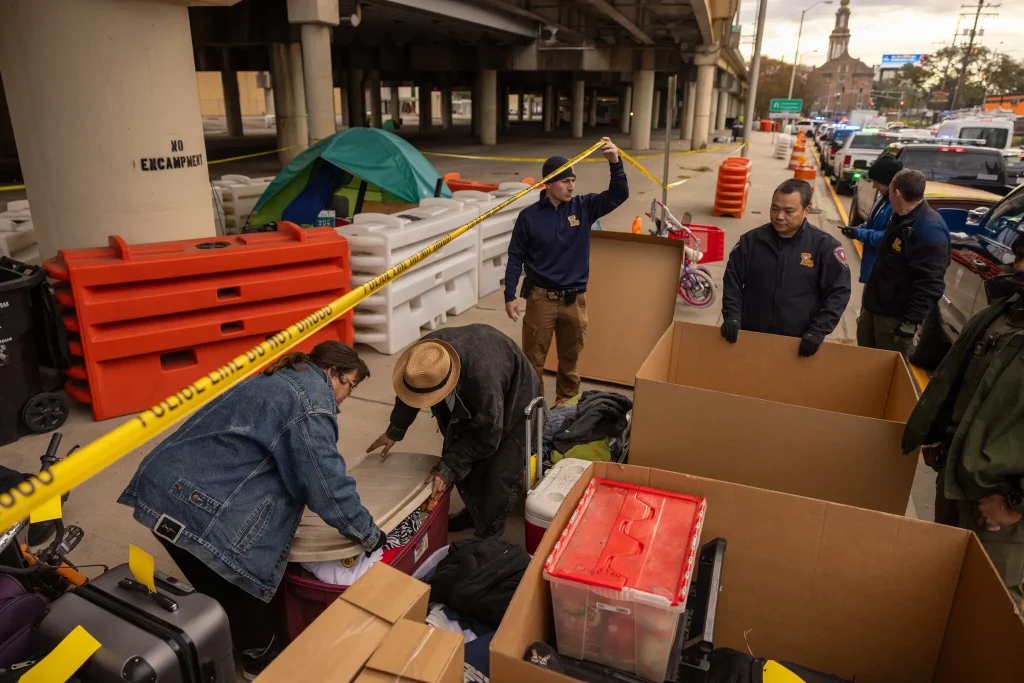Louisiana Moves Homeless Out of Sight in New Orleans

In recent news, the focus has turned to New Orleans, where Louisiana authorities have taken steps to relocate the city’s homeless population to less visible locations. This controversial decision comes as the city grapples with rising concerns over homelessness, public safety, and urban aesthetics. While the plan has been framed as a way to address the visibility of homelessness, it has also sparked intense debate, with critics questioning whether the solution truly addresses the root causes of homelessness or simply pushes the problem out of sight.
The initiative to relocate homeless individuals is part of a broader effort by local government officials to improve public spaces, ensure safety, and enhance the city’s image, particularly in popular areas frequented by residents and tourists. By clearing homeless encampments from certain locations, authorities believe they can reduce issues such as litter, crime, and public health risks. City officials argue that making these public spaces more accessible and aesthetically pleasing is essential for fostering a sense of safety and well-being in New Orleans, which is known for its vibrant tourism industry and rich cultural heritage.
However, this decision has drawn significant criticism from homeless advocacy groups and social justice organizations, who view the move as a shortsighted and inhumane solution to a deeply complex issue. They argue that simply relocating individuals to less visible areas does not solve the underlying problems that lead to homelessness, such as the lack of affordable housing, limited access to mental health services, and insufficient social support systems. Instead of addressing these systemic issues, critics claim that the move amounts to “sweeping homelessness under the rug,” as the most vulnerable members of society are displaced rather than provided with the resources and care they need to rebuild their lives.
Homeless advocates also warn that relocating individuals to more remote areas could have detrimental effects on their ability to access essential services, including shelters, food programs, medical care, and legal support. Many homeless individuals rely on proximity to the city center to access these services, and moving them further away could create additional barriers to survival. Furthermore, isolating homeless people from the broader community can exacerbate feelings of stigma, alienation, and hopelessness, making it even harder for them to reintegrate into society.
The ethical concerns surrounding the relocation of homeless individuals have also been compounded by the broader issue of criminalization. Many cities across the United States, including New Orleans, have implemented laws that effectively criminalize homelessness by banning activities such as camping in public spaces or sitting on sidewalks. These laws, often referred to as “anti-camping” ordinances, are criticized for disproportionately targeting vulnerable populations and penalizing individuals who have nowhere else to go. Critics argue that such policies only deepen the trauma and marginalization experienced by homeless people, rather than offering solutions that promote long-term stability.
Despite these concerns, some proponents of the relocation plan argue that it is a necessary step to improve safety and public order in the city. They cite instances of violent crime, drug use, and sanitation issues in areas with large homeless populations as justification for the move. Supporters also contend that the relocation will encourage local businesses and residents to feel more comfortable in public spaces, ultimately benefiting the broader community.
As New Orleans moves forward with its plan, local officials have promised to ensure that displaced individuals will be offered housing and services to support their transition. They emphasize that the relocation is not meant to be a punitive measure, but rather a temporary solution while more permanent housing options and social services are developed. However, critics remain skeptical, questioning whether the government’s commitment to providing adequate support will be enough to truly address the needs of the homeless population.
This situation is emblematic of the broader challenges faced by cities across the country in dealing with homelessness. As urban populations continue to grow and economic inequality widens, more and more cities are grappling with how to manage homelessness while balancing the interests of residents, businesses, and vulnerable populations. Finding sustainable and compassionate solutions requires a multi-faceted approach that includes not only emergency services, but also long-term investment in affordable housing, mental health care, and job training programs.
Ultimately, the controversy surrounding New Orleans’ approach to homelessness highlights the complexity of the issue and the difficulties in finding effective solutions. Relocating individuals to less visible areas may temporarily address some public concerns, but it is unlikely to provide lasting relief without addressing the root causes of homelessness. For meaningful change to occur, it will be crucial for local governments to collaborate with advocacy groups, service providers, and the homeless population itself to develop strategies that prioritize dignity, support, and sustainable solutions.
In conclusion, Louisiana’s decision to relocate the homeless population in New Orleans has stirred significant debate, raising important questions about how cities should address homelessness in a way that balances public interests with the needs of vulnerable individuals. The decision’s effectiveness will depend largely on whether it is part of a comprehensive plan that includes housing, healthcare, and social services to help people move from the streets into stable and supportive living situations. While relocation may reduce visible homelessness in the short term, it cannot replace the long-term solutions needed to address the root causes of the crisis and ensure that every person has a safe and secure place to call home.






